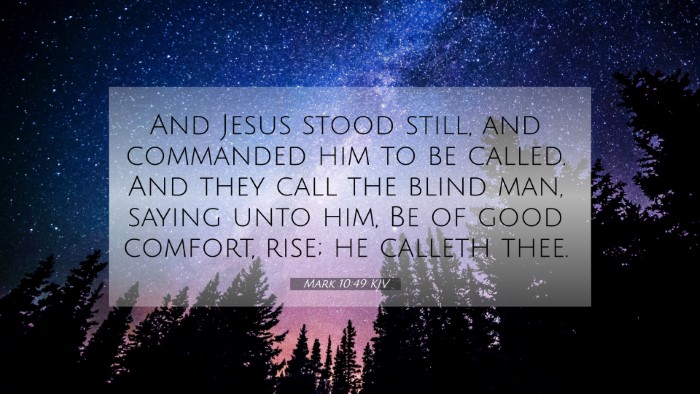Understanding Mark 10:49
Verse: "And Jesus stood still, and commanded him to be called. And they call the blind man, saying unto him, Be of good comfort, rise; he calleth thee."
In this verse, we find a significant moment in the narrative of Jesus' ministry, particularly highlighting His compassion and willingness to engage with those in need. The context involves a blind man named Bartimaeus calling out to Jesus as He passes through Jericho, demonstrating both faith and desperation.
Commentary Insights
Matthew Henry's Commentary
Matthew Henry emphasizes the initiative of Jesus in responding to the blind man's call. The phrase "stood still" illustrates Jesus' attentiveness to human need, showing that despite the pressing crowd and his journey, He is never too occupied to respond to the cries of those seeking help. This reflects a profound truth about the nature of Christ: He is accessible and ever ready to provide for those who seek Him earnestly.
Albert Barnes' Commentary
Albert Barnes notes the encouragement given to the blind man by the bystanders, who tell him, "Be of good comfort." This phrase signifies a shift from despair to hope, as he realizes that Jesus is calling him. It underscores the theme of hope that permeates the Gospel message, illustrating how Jesus transforms desperation into faith and action. Barnes also points out that the act of calling Bartimaeus further establishes the personal relationship that Jesus fosters with individuals.
Adam Clarke's Commentary
Adam Clarke takes a deeper look into the social implications of the event, highlighting that the blind man, marginalized by society, receives special attention from Jesus. Clarke underscores how this interaction exemplifies Jesus' ministry to the outcasts and the lowly, reinforcing the message that God's love extends to all, regardless of their social standing. It reflects a broader theological theme of inclusion and divine compassion.
Bible Cross-References
- Matthew 9:27-30: The healing of two blind men who also called out to Jesus, showcasing faith and recognition of Jesus' messianic identity.
- Luke 18:35-43: The same story of Bartimaeus, reinforcing the theme of faith and Jesus’ compassion in healing the blind.
- John 9:1-12: The account of the man born blind, illustrating the themes of spiritual insight versus physical blindness.
- Mark 5:35-43: The healing of Jairus’ daughter, showing Jesus' authority over life and death and His responsiveness to human needs.
- James 4:8: "Draw nigh to God, and he will draw nigh to you," reflecting the principle that those who seek God earnestly will find Him.
- Psalm 34:18: "The Lord is nigh unto them that are of a broken heart," emphasizing God’s closeness to those in distress.
- Romans 10:13: "For whosoever shall call upon the name of the Lord shall be saved," connecting the call upon Jesus with salvation.
Thematic Bible Verse Connections
This verse reveals several themes crucial for understanding the narrative of the Gospels:
- Faith: The blind man's faith in Jesus’ ability to heal him is pivotal; it links to many other verses discussing the importance of faith in the healing process.
- Compassion: Jesus’ empathy for those marginalized by society is a recurring theme throughout the Gospels, illustrating His mission to save and restore.
- Divine Encounter: The personal nature of the encounter between Bartimaeus and Jesus exemplifies how personal interactions with Jesus lead to transformation.
Conclusion
Mark 10:49 serves as a powerful reminder of Jesus' readiness to respond to those who call out to Him. By analyzing this verse alongside related texts, we can appreciate the broader theological themes of faith, compassion, and personal transformation within scripture. Through tools for Bible cross-referencing and thorough examination of biblical texts, believers can uncover deep insights into the interconnectedness of scripture and the heart of the Gospel message.
Further Study
For deeper understanding and research, consider using a Bible concordance or a Bible cross-reference guide. These tools can enhance your study of Bible verses, allowing for insightful connections and comprehensive understanding of scriptural themes.









